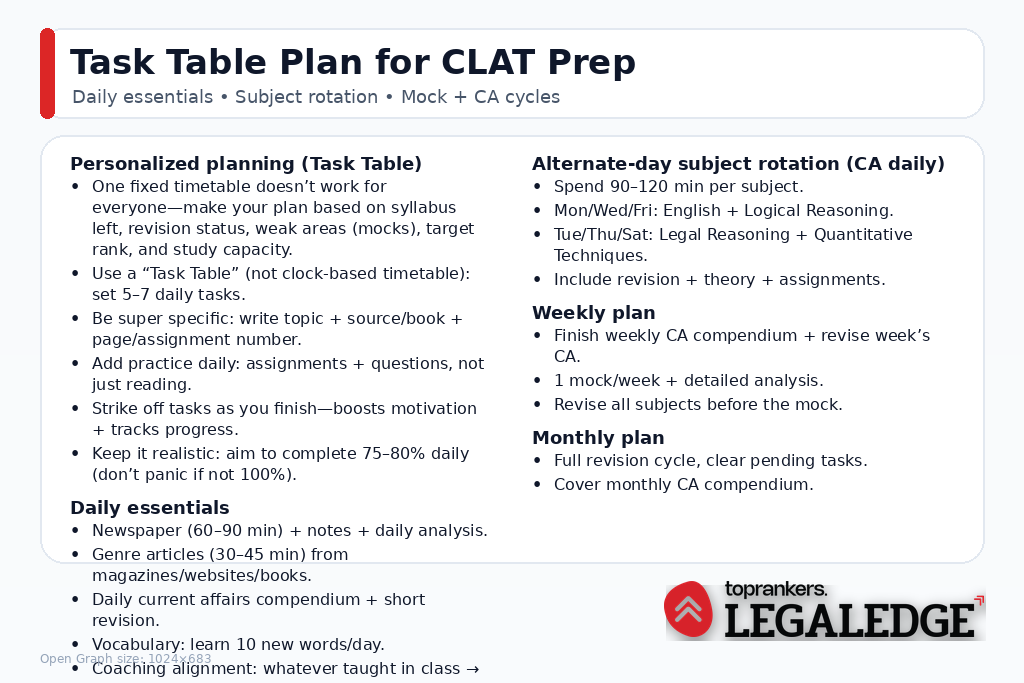How To Balance Daily Routine For CLAT 2027 Preparation
January 5, 2026
Reader's Digest: You name it; we solve it! Read this blog post to learn what the daily routine of CLAT 2027 aspirants should look like. Get insights into the daily, monthly, and yearly task table for CLAT 2027 and more.
Due to the increasing competition, it might be difficult for most of you to prepare for the CLAT exam. However, it is easy to crack the exam by following a well-structured study plan for CLAT.
Following a single task table that will help you achieve good results is a myth because every aspirant's preparation strategy is different.
You will have weak and strong areas, and your preparation strategies may vary. Hence, we recommend you prepare your task table based on the following factors:
- Amount of syllabus left
- Status of revision
- Weak areas (based on your mock performance)
- Targets to be met (if you are aiming for AIR below 10, your task table looks completely different)
- Study capacity (based on your ability to study for long hours)
An extremely important part of preparing for a competitive exam is figuring out how to prepare and attempt the examination you are sitting for. This video on CLAT 2027 strategy is a must-watch for all CLAT 2027 students.
Best Short Tricks to Make the Best Study Schedule for CLAT 2027
The following techniques will enhance your CLAT exam preparation and help you score well on the upcoming exam.
- Create a Task Table: Instead of a traditional timetable, choose a table with 5 to 7 daily tasks. This allows for more flexibility and focuses on completing specific tasks rather than fixed study hours.
- Be Specific: When planning your daily study tasks, specify what you must study. Instead of just writing the subject's name, mention the topic, book name, and page number. For example, "Constitutional Law: Fundamental Rights, Book: XYZ, Pages 50-70."
- Include Assignments or Practice Questions: Incorporate assignments or practice questions in your daily study plan. If you use a specific study material like LegalEdge, mention the assignment numbers to complete. This ensures active engagement with the subject matter.
- Strike Out Completed Tasks: After completing each topic or assignment, remove it from your task list. This simple action provides a sense of accomplishment, motivates you to continue, and builds confidence as you see progress.
- Be Realistic: Make a rational list that you can realistically complete. Avoid overburdening yourself with an unrealistic number of tasks. Aim to complete at least 75 to 80% of the tasks on your list to maintain consistency and avoid feeling overwhelmed.
Remember, even if you cannot complete all the tasks listed by the end of the day, don't get demotivated. It is okay if you do not finish all the listed tasks. Just try to find out whether the task list you have completed until that time is covered entirely or not.

How to Make a Daily Task Table for CLAT 2027?
You must keep the following points in mind while creating a daily task table for the CLAT entrance exam:
DAILY STUDY PLAN for CLAT
- Begin your day by reading a newspaper, preferably The Hindu. You can devote 60-90 minutes (about 1 and a half hours) to this.
- You should also make notes and Daily Newspaper Analysis.
- You should also give 30 – 45 minutes to read genre-specific articles from magazines, websites and CLAT books.
- You can cover all the current affairs every day from the Daily Current Affairs compendium.
- You should build your vocabulary daily and try to learn at least 10 new words.
- If you are associated with or plan to join any coaching classes, align your classes with your study materials. Whatever is done in your classes should also be completed from your end.
ALTERNATE DAYS STUDY PLAN for CLAT
- You should keep current affairs every day. Other subjects can be aligned every alternate day.
- At least 90-120 minutes (about 2 hours) should be devoted to each subject.
- English and Logical reasoning on Monday, Wednesday, and Friday.
- Legal Reasoning and Quantitative Techniques on Tuesday, Thursday, and Saturday.
- This should include your previous revision, theory coverage, and assignment practice.
WEEKLY STUDY PLAN for CLAT
- You should complete a weekly compendium of current affairs.
- Through revision of the current affairs covered in the week.
- Revise all the subjects thoroughly before attempting a mock.
- You should give one mock every week and analyze them in detail.
MONTHLY STUDY PLAN for CLAT
- Revise everything thoroughly.
- Cover all the pending tasks by the end of the month.
- Cover current affairs from any Monthly Current Affairs compendium.
Yearly Study Plan for CLAT 2027 Preparation
| Month | English Language | Current Affairs Including General Knowledge | Legal Reasoning | Logical Reasoning | Quantitative Techniques |
|---|---|---|---|---|---|
| Month 1 | - Develop reading habits | - Start reading newspapers and magazines daily | - Understand legal principles and reasoning techniques | - Practice identifying arguments and analyzing patterns of reasoning | - Review basic mathematical operations and formulas |
| Month 2 | - Improve reading speed and comprehension skills | - Focus on current affairs and general knowledge topics | - Analyze legal fact scenarios and apply general principles to them | - Practice recognizing and evaluating arguments | - Solve practice questions involving ratios, proportions, and basic algebra |
| Month 3 | - Learn strategies for tackling passage-based questions | - Deepen knowledge of current affairs and international events | - Familiarize yourself with legal and moral issues | - Enhance critical thinking and inference skills | - Work on numerical information derivation and manipulation |
| Month 4 | - Practice summarizing passages and drawing inferences | - Explore historical events and their significance | - Analyze the impact of changes to rules and principles | - Develop analytical reasoning skills | - Continue practising quantitative techniques |
| Month 5 | - Strengthen vocabulary and word usage | - Focus on arts, culture, and other relevant topics | - Improve understanding of legal and moral philosophy inquiries | - Work on drawing relationships, identifying contradictions, and assessing arguments | - Review statistical estimation and data interpretation techniques |
| Month 6 | - Solve practice questions on main point and viewpoint | - Stay updated with contemporary events of significance | - Enhance comprehension of legal passages and apply rules/principles | - Analyze the effectiveness of arguments | - Refine skills in mathematical operations and problem-solving |
| Month 7 | - Practice comparing and contrasting arguments | - Dive deeper into international affairs and their impact | - Develop awareness of public policy questions | - Strengthen inference skills and apply them to new situations | - Work on mensuration and geometry concepts |
| Month 8 | - Work on understanding the meaning of words and phrases | - Revise and consolidate knowledge of current affairs | - Continue practising legal reasoning with fact scenarios | - Enhance analytical and critical reasoning skills | - Practice data interpretation and analysis |
| Month 9 | - Review past CLAT English language questions | - Recapitulate important events and their significance | - Focus on the application of principles and propositions to factual situations | - Practice drawing analogies and assessing argument effectiveness | - Solve mock tests and previous year's quantitative questions |
| Month 10 | - Solve mock tests and previous year's English questions | - Practice answering questions based on news articles | - Revise legal and moral issues and apply them to scenarios | - Analyze patterns of reasoning and assess conclusions | - Analyze weak areas and work on improving quantitative skills |
| Month 11 | - Revise grammar rules and improve language skills | - Continue staying updated with current affairs | - Practice legal reasoning exercises and enhance rule application | - Work on time management and efficient problem-solving | - Solve sample papers and identify areas for improvement |
| Month 12 | - Finalize exam strategy and focus on time management | - Consolidate knowledge of general knowledge topics | - Engage in the timed practice of legal reasoning questions | - Solve full-length practice papers and analyze the performance | - Review all quantitative techniques and formulas |
Conclusion
Now, you know what the daily routine of CLAT aspirants should look like. You may adopt this daily routine to ace CLAT 2027 like a pro. Make a task table for CLAT 2027 preparation and follow it religiously to maintain consistency. Good Luck with your preparation! Happy Reading!
PUSH YOURSELF BECAUSE NO ONE ELSE IS GOING TO DO IT FOR YOU.
Frequently Asked Questions
How many hours should I study for CLAT Exam?

Is 1 month enough for CLAT Preparation?

How to Prepare for the CLAT Logical Reasoning Section?

How to Prepare for CLAT GK section in one month?

How can I improve my accuracy in the CLAT exam?

Can I complete the CLAT syllabus in three months?

How much time should I keep aside for revision in the CLAT study plan?




SHARE